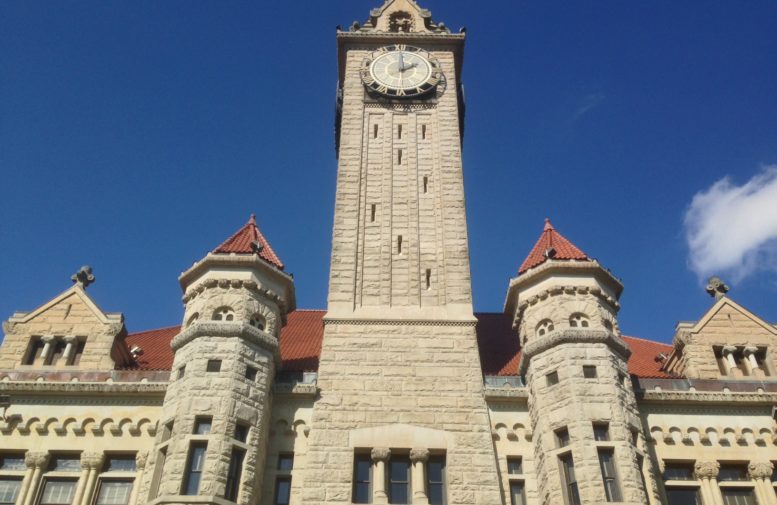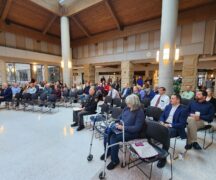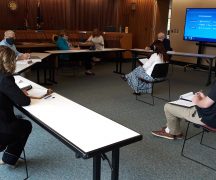By JAN LARSON McLAUGHLIN
BG Independent News
Wood County Commissioners are worried they are about to get the short end of the sales tax stick. And that could mean $900,000 less coming into the county each year.
The issue is rather confusing, but here goes. Since 2010, the state of Ohio and its counties have been collecting sales tax from Medicaid Managed Care organizations, which provide medical services and equipment. Those sales taxes brought in about $597 million a year for Ohio and other $200 million for counties.
But in 2014, the federal government decided that the Medicaid sale tax was not proper. Ohio was told it either had to apply the sales tax to all managed care – not just those serving Medicaid clients – or to none. The feds also objected to the fact that since the U.S. government pays at least 60 percent of Ohio Medicaid costs, it was basically paying an indirect federal subsidy to Ohio.
Now here’s where it gets even more confusing – and frustrating to local officials.
Gov. John Kasich asked and received a waiver on the sales tax that will make the state whole. In fact, the state may bring in a bit more – $615 million a year. The problem is, Kasich failed to include counties in on the waiver.
The governor’s budget will reimburse counties a portion of the sales tax revenue for one year – but then counties are on their own.
“It only corrected the state’s problem,” said Wood County Administrator Andrew Kalmar. “It leaves the counties out. They need to adjust that formula to fix everyone’s problem, not just their own.”
So as it stands now, Wood County will be out $900,000 a year. That’s 3 percent of the county’s general fund of approximately $41 million.
The pain will be even greater for bigger counties, Kalmar said, noting that Lucas County stands to lose up to $11 million a year.
The Wood County Commissioners believe they have endured enough funding cuts from the state and economic factors. Those include cuts to the local government fund, elimination of personal property tax, a severe economic recession, an interest rate that remains near zero, and reductions in property tax valuations.
So last August, the commissioners sent a letter to Ohio Senate President Keith Faber, asking for a solution to the expected $900,000 loss.
“There is no other local revenue source available to cushion this reduction,” the commissioners said in their letter.
No solutions were offered, so the commissioners sent another letter in February, this one to State Sen. Randy Gardner and State Rep. Theresa Gavarone, both R-Bowling Green. The commissioners criticized the state’s remedy that offers a cure for the state only.
“The state and local governments have the same problem with regard to this revenue source,” the letter stated. “So why is the proposed ‘responsible’ solution one that fixes the state’s problem, while telling local governments that they will have to ‘work to reduce their reliance on this seven-year-old state sales tax program.’”
The commissioners asked for Gardner’s and Gavarone’s help solving the problem.
“We clearly recognize that this is Governor Kasich’s ill-conceived solution,” the county commissioners said.
Another letter followed in May, asking Gardner to take a lead in the effort to restore the funds for counties.
Gardner said he was supportive of the commissioners’ position.
“I’m with the counties on this. I would like to see full restoration, in part because of the Local Government Fund issue of the past number of years,” he said. “I think the commissioners have expressed a legitimate concern.”
However, as the state budget talks come down to the wire, the issue is still up in the air.
“It is still a matter of debate in the state budget,” Gardner said on Wednesday.
“I believe local governments should have been included in the waiver,” he said. “But as of now, counties are recovering only partial funding in the first year.”
“My preference will be to restore the sales tax revenue for counties,” Gardner said. “I’ve made my position clear to the leadership from day one.”
But as far as taking a leading role in recovering the sales tax revenue, Gardner said he has already used his political sway to defend funding for libraries and all levels of education.
Gavarone said she “absolutely” wished that counties had been included in the state’s waiver request. But since they weren’t, restoring the county sales tax would mean raising taxes or cutting services by the state, she said.
“We’re in a really tight budget,” she said on Thursday as the budget was being debated in conference committee. “It’s a really tough situation. We have limited resources.”





